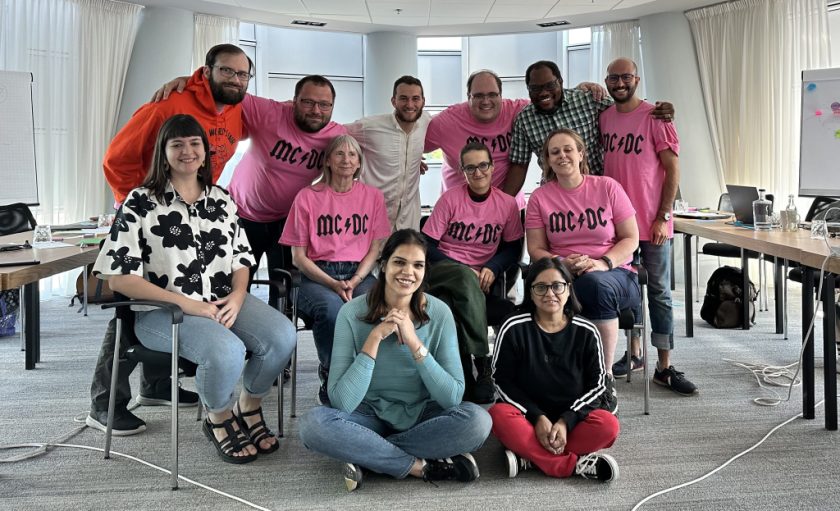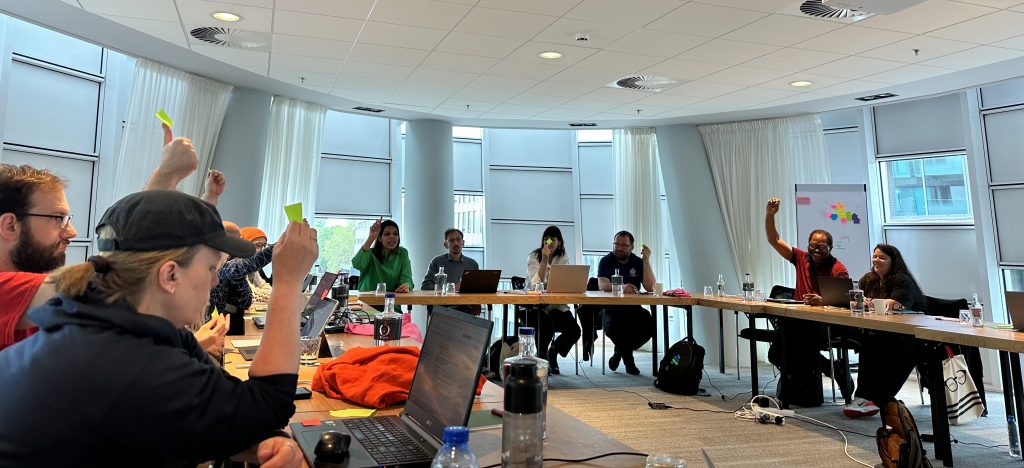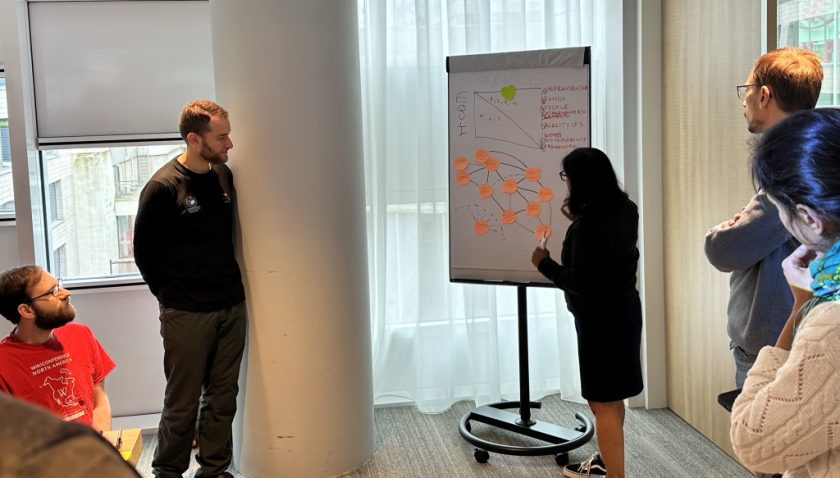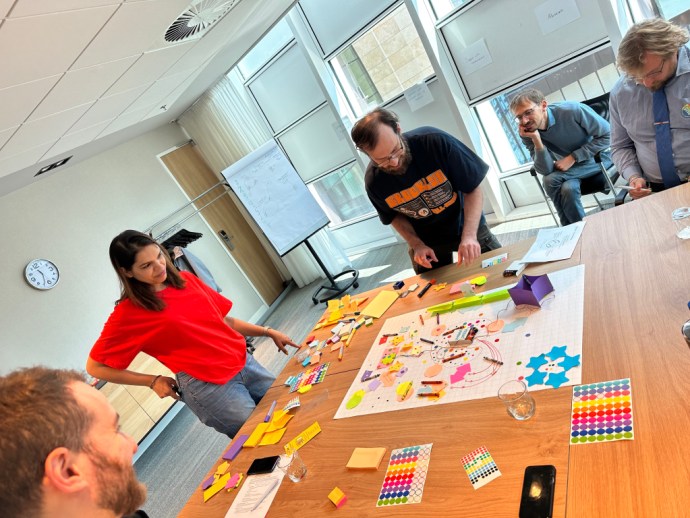
From 2 to 4 June 2023, the Movement Charter Drafting Committee (MCDC) gathered in Utrecht, Netherlands, to work on key chapters of the Wikimedia Movement Charter: the Global Council, Decision Making, Hubs, Roles & Responsibilities, and the Glossary.
Each and every MCDC member has been dedicating their precious time since 2021 to fulfill their shared responsibility of drafting a charter for the Wikimedia movement. Now, it is time for the movement to support the MCDC in delivering a charter that is impactful, based on our collective vision and principles, and set on a strategy for 2030. Responsibility is shared and the awaited moment for communities to actively engage with the draft of the Movement Charter is here. See next steps below and find out about how you and your community members can engage!
Celebrations, rabbit holes and parking lots: big topics to consider

While they regularly collaborate online, this was only the third time the MCDC had the opportunity to come together and work in person. The sessions were output-oriented, fostering collective thinking, and encouraging individual compromises to reach alignment. In light of the upcoming global community conversations centered around the largest part of the Charter: the Global Council, Decision Making, Hubs, Roles and Responsibilities, and the Glossary, the MCDC agreed on embracing “good enough” rather than striving for perfection to progress on their drafting. It is only with community feedback and input that the drafts of the Movement Charter can further evolve and subsequently be ratified by the movement.
The MCDC had to agree as a collective on some important topics about the Global Council and Hubs. They discussed the purpose of the Global Council and its roles when it comes to movement resources, structure, and membership, among others. For the Hubs, the discussions touched upon the definition and purpose, membership and composition, setup, and governance processes. The face-to-face facilitated conversations greatly accelerated the process of reaching agreements on significant matters concerning the Global Council and Hubs.
A historical effort

The idea of establishing a global body that would represent diverse communities and drive structural changes has been a topic of discussion in the Wikimedia movement since as early as 2005.
One of the earliest proposals was the WikiCouncil in 2005. The purpose was to act as a representative body for all Wikimedia projects and work alongside the Wikimedia Foundation’s Board of Trustees (BoT). The rationale behind the group’s proposal was to help local projects, improve communication, and empower communities. There was no agreement on the need for such a Council at that time so early on our wiki journey. There were concerns about adding bureaucracy and the complexity of striving for representation. These concerns remain to this day even though our movement has grown in anticipated and unprecedented ways around the world and the need for equity in decision-making has since been clearly expressed.
A more structured effort was made in 2010 during the Movement Roles project. It aimed to explore and define the various roles within the Wikimedia movement and how they contribute to the overall mission. As a result of the Movement Roles project, the Affiliations model was developed: in addition to chapters, user groups and thematic organizations also became possible forms of Wikimedia entities. The previous “Chapters Committee” was expanded in scope into the current Affiliations Committee.
The Movement Roles project also proposed a movement charter with the purpose of helping the movement develop as a strong global network to achieve its mission, with the hope that the charter would support the movement and increase its reach to the underrepresented parts of the world. The charter remained at a partial draft stage and was not completed. Many of the ideas put forward in this project influenced the 2030 Movement Strategy recommendations, including the ongoing Movement Charter drafting.
In 2012, during the Wikimedia Conference in Berlin, members of 30 chapters came together to establish the Wikimedia Chapters Association. The Association was composed of one representative from each chapter and one person collectively representing all user groups. It was intended to further support knowledge exchange and participation of the affiliates. A year after its first meeting, it became effectively dormant due to many issues, including a lack of agreement on the Association’s purpose, its exact executive duties, and the potential office location.Two years later, the Chapter’s Dialogue was a major effort to listen to the needs, goals, and experiences of Wikimedia chapters. Some of the most pressing issues that were prevalent in 2013 are still relevant or lingering today, including the need for leadership in the movement.
In 2017, a strategic direction was created to guide our movement into the future: By 2030, Wikimedia will become the essential infrastructure of the ecosystem of free knowledge, and anyone who shares our vision will be able to join us. From 2018 to 2020 people from across the movement came together to develop the Movement Strategy recommendations and guiding principles. The development of the Movement Charter and the Global Council stems from the Movement Strategy recommendation 4: “Ensure Equity in Decision Making”. Initially, it was suggested that an Interim Global Council (IGC) would oversee the establishment of the Movement Charter and the Global Council. In the process, the IGC’s responsibility for drafting the Movement Charter was transferred to the Movement Charter Drafting Committee. The MCDC’s efforts are informed by the previous attempts at developing a charter, the vision of the 2030 Movement Strategy, and their own knowledge and expertise from diverse communities.
What’s next?

There are questions and discussion points that require input from the wider community in order to ensure that in the end, the Charter is truly the result of the collaborative efforts of our global movement. The community conversations will take place from July to September. The new chapters will be shared on Meta in segments in order to allocate sufficient time for the Wikimedia Movement to get acquainted with the texts.
- The Global Council and Decision-Making chapter will be available on Meta on 12 July.
- Hubs, Roles and Responsibilities, and the Glossary will be available on Meta on July 26.
Individuals or groups from under-resourced language communities are invited to apply for a grant to organize conversations in their languages. The Regional Specialists of the Movement Communications team will be of support to any community organizers.
The schedule of upcoming community conversations will be announced in early July. The MCDC plans to make use of existing community gatherings in order to listen to the Wikimedia movement. If you want to start conversations on the Charter in your community, please contact the support team at movementcharter@wikimedia.org or on the Meta talk page.
We hope to see you in community conversations.

Can you help us translate this article?
In order for this article to reach as many people as possible we would like your help. Can you translate this article to get the message out?
Start translation